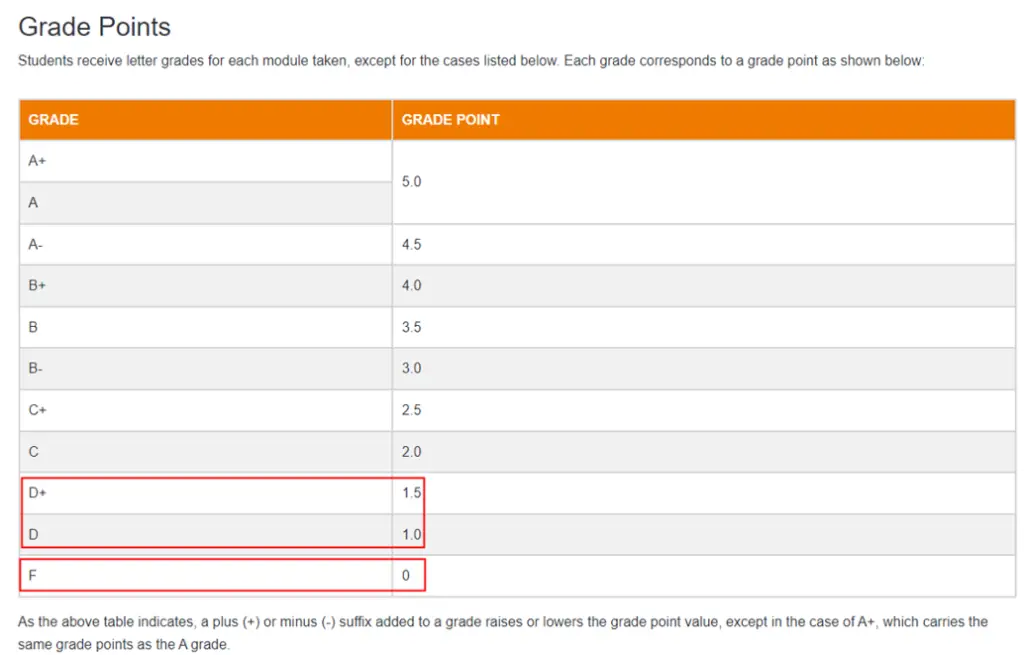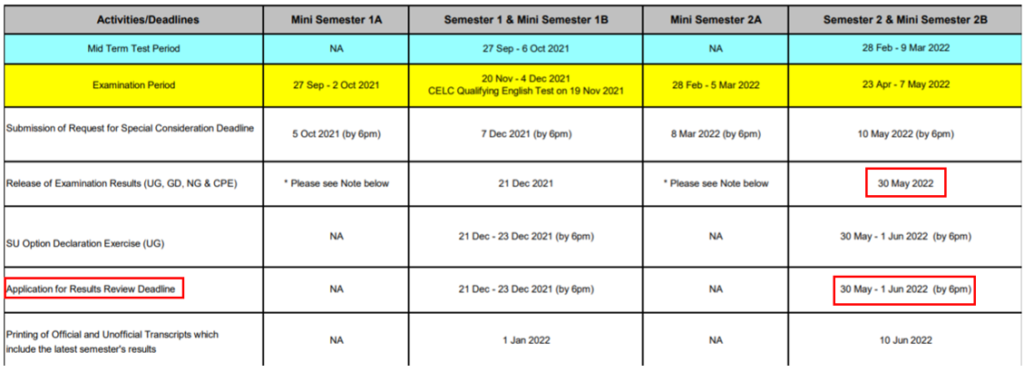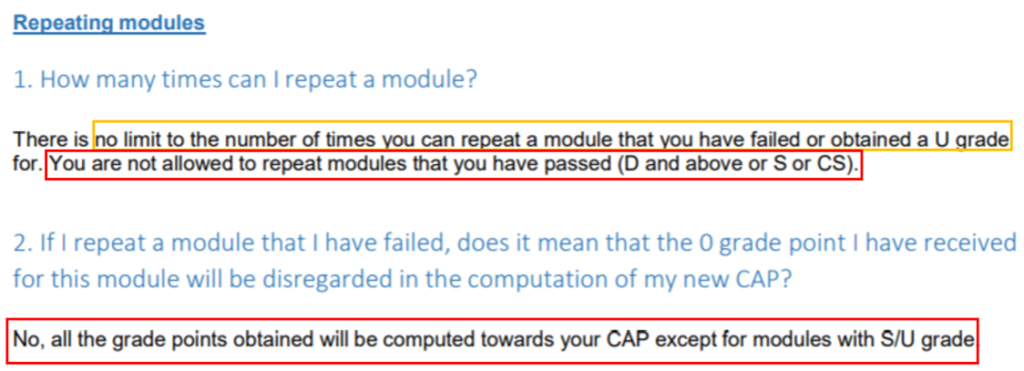Receiving a failing grade is probably one of the worst feelings that you could have as a student – no matter the level of education that you are at. Albeit not very common, it is definitely still a possibility and thus the topic of today’s article.
We will be exploring the notion of failing a module and tackling some questions that you might have, such as “what exactly are the repercussions of failing?”.
So let us begin with the most important question of all!
Contents
What grade is considered a fail in NUS?

NUS follows a CAP-based grading system, where your CAP is calculated based on the average grade point of all the modules taken by a student.
“The grade point of a module is based on the letter grade received for it.”

Like all forms of education, the ‘F’ grade is considered a failing grade where you will obtain 0 grade points for it.
“However, it is also possible to consider the ‘D+’ or ‘D’ grade as a failing grade.”

As stated by NUS, having a CAP of below 2.0 for 2 consecutive semesters will result in you being dismissed from the university – AKA scoring consistently ‘D+’, ‘D’ or ‘F’ for your modules.
Henceforth, I do also personally consider ‘D+’ or ‘D’ as pseudo-failing grades and would highly suggest trying not to score either of them too!
What happens when you fail a module in NUS?
Failing a module will have certain repercussions.
#1 Effect on your CAP
The most direct consequence of failing a module will be its effect on your CAP – if it is a graded module.
If the module is graded, getting an ‘F’ grade will net you 0 grade points (as mentioned above) and for sure, pull down your CAP for that semester.
“Failing a non-graded module, i.e. not completing their stipulated tasks, will not affect your CAP.”

For example, as a CHS student, I was required to take the ungraded module, HS1401S – a career preparatory module. As it was an ungraded module, failing it would not have had any effect on my CAP.
#2 Possibility of needing to retake the module
If your failed module falls into either of these categories, do expect to retake them:
- Prerequisite for other modules in your later years
- Requisite for graduation
Using GEA1000 as an example – GEA1000 fulfils the data literacy pillar of the new General Education curriculum of NUS and is thus a requisite for graduation.

In the event that you fail GEA1000, scoring an ‘F’, you will be pre-allocated the module again the next semester – being forced to retake the module.
“As such, as long as your module does not fall under either of the aforementioned categories, it will not be compulsory for you to retake the module.”
But you will still, unfortunately, have to bear the consequences of failing it, i.e. decrease in your CAP.
#3 Pushing back of graduation
If you are retaking your modules (above section), you might be at risk of pushing back your graduation.
“For instance, a Reddit user shared how he had to take 10 semesters instead of 8 to fully complete his degree due to his unsatisfactory grades as a result of personal issues”.
However, more than likely, you will be able to circumvent this as you do have to fail numerous prerequisite modules to have your graduation pushed back!
Is it easy to fail a module in NUS?
Fortunately, while it might be easy to do badly for a module (‘D’ grade), failing a module (‘F’ grade) is surprisingly hard.
According to this old BUT still highly referenced blog post, the amount of students within a module who receive a D or F grade is less than 5% – which means in a cohort of 200 students, only around 10 will receive a D or F.
“This doesn’t mean that if you do your submissions, continuous assessments or finals haphazardly without studying, that you will not get an ‘F’, because you probably will”
What this means is that as long as you do your best to understand the content and do your submissions or study for your papers – that you more than likely will not fail.
My professors did also mention briefly that ‘F’ grades are extremely rare and that to give one, they have to produce documentation or a report to justify their action to their higher-ups.
Here a certain reasons why you would get an ‘F’ grade:
- Being caught for plagiarism – plagiarizing from any source is a serious academic offence and will leave you liable to disciplinary action (possibility of an instant ‘F’ according to my lecturers)
- Cheating during exams/tests – same as plagiarism
- Not submitting your submissions or doing them badly – certain modules do require you to submit all CA assignments to pass.
- Missing your exams/finals
- Error in moderation or grading – it is also entirely possible for you to be given an ‘F’ grade incorrectly. In situations where you suspect that this might have happened, you can appeal to have your marks retallied (covered in the next section)
Appealing of Results
Disclaimer: If you intend to appeal your results, do ensure that you have grounds to suspect the wrong tallying of your grades – i.e. doing well or passing all your assignments & papers but suddenly failing with an ‘F’. Appealing will not magically give you more marks than you scored!

As mentioned above, in unfortunate circumstances, it is entirely possible to be wrongly assigned an ‘F’ grade. If you suspect that this has happened, you can request a results review.
The review will ensure that:
- Your exam script has been marked completely – i.e. all the questions are given their appropriate marks
- Your grades have been tallied and properly passed on to the Board of Examiners – i.e. all marks are accounted for and provided
The review will not result in:
- Your exam script being marked again – i.e. the initial marking is disregarded and all the questions are marked for a second time

You only have slightly more than a day after the release of results to apply for a review so do take close note of that also!
“So for example, results release for Semester 2 AY 21/22 is on 30th May 2022 & the deadline for applying for a review is the 1st June 2022 at 6 pm.”
Note: Full steps on how to apply for a review can be found here.
Am I able to retake a module in NUS?

As seen above, you can retake a module infinitely – if you continuously score either an ‘F’ grade or ‘U’ grade for it.
However, if you pass a module, scoring a ‘D’ grade or better, you will not be able to retake the same module in future semesters.
“So for example, if you were to score a ‘C’ grade and wanted to retake the module to score an ‘A’ grade, that is, unfortunately, not possible!”
Another key point to also take note of is that if you do retake a module, your previous grade for the module will STILL be taken into account for CAP calculation.
This means that the new grade for retaking the module will not override your previous failed attempt – i.e. the ‘F’ still counts to your cap.
Conclusion
In summary, while scoring an ‘F’ grade is quite uncommon, it is still extremely possible if you decide to not put any effort into your modules.
While the University will still allow you to retake the module and pass, the negative repercussions of an ‘F’ grade are something that I would highly suggest you avoid!
You can find out more about S/U-ing modules in NUS here too.
If you enjoyed this content, do follow us on Telegram!

Want to earn some money while sharing your experiences in Singapore? We’re always looking for writers and you can join our team here!
